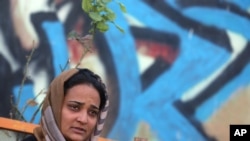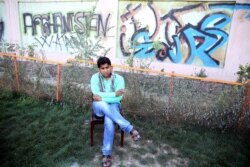Evacuation efforts for Afghan journalists are stepping up amid reports that Taliban fighters have been searching the homes of some media workers.
In the past week, the Taliban have searched properties belonging to at least five journalists, media rights organizations said.
On Friday, armed men searched a property belonging to Zalmai Lotfi, head of Enikass TV, and they removed office equipment and his vehicle.
The journalist had earlier gone into hiding over concerns for his safety, and the station has stopped broadcasts, according to the International Federation of Journalists (IFJ).
Homes belonging to journalists who work for German broadcaster Deutsche Welle (DW) and a freelance stringer also were searched in recent days, and the relative of one reporter was killed, according to DW and media rights groups.
In Kabul, VOA has confirmed at least two cases of journalists being harassed by the Taliban. In both cases, the reporters were questioned about stories that were critical of the group before they overtook the city.
In the case of Enikass, the independent media outlet moved its operations from Jalalabad, the capital of Nangarhar province, to Kabul to better protect staff, IFJ said. Gunmen have killed four of its employees — all of them women — since December.
Islamic State Khorasan Province (ISKP), a branch of Islamic State, claimed responsibility, saying the women were targeted because they worked for pro-government media outlets.
Uncertain future
The reports of harassment and searches come a week after the Taliban held its first news conference in Kabul.
A Taliban spokesperson said media were free to report and that the Taliban have offered amnesty to those who worked with the U.S. or Western governments, The Associated Press reported.
In a second press conference Tuesday, Taliban spokesman Zabihullah Mujahid said the group would look “into the issue of media organizations.”
"Maybe there are incidents, small incidents. Maybe some of our fighters are near your offices,” Mujahid said. “We will be removing our forces from near media offices, and you can work freely."
He added that female journalists had nothing to fear, telling a reporter, "You are civilians. There is no crime in being a journalist. You have nothing to fear. You can go back to your province and work."
The U.S.-based International Women’s Media Foundation (IWMF) says the Taliban’s pledge “doesn’t square” with what it is hearing from Afghan media.
Female journalists at state-run outlets have also reported the Taliban told them to stay home, after taking over their newsrooms.
“We have heard directly from journalists on the ground that the Taliban [have] been searching for them, and [have] come to their houses, and they are terrified,” IWMF Deputy Director Nadine Hoffman told VOA.
She added that many of the women “feel that everything they've worked for the last 20 years has disappeared overnight.”
“If we don't protect the women journalists who've been doing this courageous work in Afghanistan and try to get them to a safer place right now, they may not be alive to continue their work,” Hoffman said.
IFJ also cast doubt on rights for media under Taliban rule.
“The unfolding reports of attacks on journalists and media workers suggest the conclusion that there is clearly no room to believe the rhetoric of Taliban leaders,” the organization said in a statement. “The fear and anxiety of the media community and the global community of media workers is clearly justified.”
Journey to safety
The IWMF is working with partners to help relocate hundreds of journalists.
It has been a “gargantuan task,” Hoffman said. “Of all of the complex, emergency assistance work that we've done over the years and that our partners have done, this is the hardest and most complicated evacuation effort that any of us have ever been a part of.”
While its focus is on women in media, Hoffman said the IWMF lists are “far beyond that at this point.”
“[We're] trying to support as many people as possible to be able to get to safety, which at this point, the focus is on getting them out of the country,” she said.
New York-based Committee to Protect Journalists (CPJ), which also is coordinating evacuation efforts, told VOA Monday it has vetted 400 cases and is reviewing thousands of other cases.
“The international community’s understanding of what is happening in Afghanistan will depend on the survival of what was once a thriving independent press, even if much of the reporting takes place from exile,” CPJ Executive Director Joel Simon said in a statement last week. “The local knowledge of Afghan journalists cannot be replaced.”
U.S. media outlets, including The Washington Post, The Wall Street Journal, Fox News and CNN also have managed to bring Afghan workers safely out of the country.
But securing the necessary visas and paperwork is just one part of the effort. Finding safe passage to the airport in Kabul is a big obstacle, the IWMF said.
The organization told VOA it is aware of cases of women and their families being beaten, shot at and threatened while trying to reach the airport. In some cases, women who managed to get close to the gate had to leave because they feared they would be attacked if they stayed.
The IWMF, CPJ and about 50 civil society organizations called on G-7 countries to prioritize the safety of Afghan journalists at its emergency summit Tuesday.







